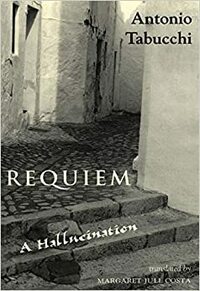Take a photo of a barcode or cover
reflective
slow-paced
Plot or Character Driven:
Character
Strong character development:
Complicated
Loveable characters:
Yes
Diverse cast of characters:
No
Flaws of characters a main focus:
Yes
reflective
medium-paced
Plot or Character Driven:
Plot
Strong character development:
No
Loveable characters:
No
Diverse cast of characters:
No
Flaws of characters a main focus:
No
Much of this novella reads like a sweaty daydream, a grumbling escape from a missed connection: the lament over an object left behind. The plot is anything but simple. A very Tabucchi like figure has a date with destiny, in this case the spirit of Pessoa. Apparently our protagonist didn't trouble himself with a confirmation email, so he's twelve hours early for his luminous encounter. What ensues oscillates between the febrile and the sumptuous. Requiem becomes a cookbook of sorts for the estranged, a meditation on the transition from an authoritarian imperialist regime to a depressed albeit European aspirant.
adventurous
challenging
dark
medium-paced
Plot or Character Driven:
A mix
Strong character development:
Complicated
Loveable characters:
Complicated
Diverse cast of characters:
Complicated
Flaws of characters a main focus:
Complicated
A slim volume packed with witty observations about life in general and Portugal in particular. Take your time with this one. It's worth savoring every word.
My dear friend, he said, life is strange and strange things happen in life
I went to bed, it was almost midnight. Three hours later, I was up drinking water and holding a book which I’ve been reading for a few days now and I’m almost finishing, filled with paragraphs that suffocate the reader due to a lack of white spaces, recipes and places that make Portugal proud, rather mundane observations interspersed with the extraordinary, dialogues that disguise themselves on purpose, and underscore the tone of a stream of consciousness but not quite—it’s a hallucination, why would I expect order?, I asked.
As I was holding the book, I knew I would write something about it as soon as I finish it; I kept listening to that voice anticipating things to say. It’s instinct; the way I see it, it isn’t born in one’s mind but in one’s gut. I can’t analyze inspiration; it comes—while turning the pages or two months later—I sit and I write. But I’m not a writer. They write for readers; I write to clear the mind and unclog the heart. I’ve been having trouble sleeping lately, it must be all those thoughts and responsibilities heavier than mountains, I assumed, that have prevented me from having a good night’s sleep since April. So I started reading the book I was holding, trying to find some sort of reassurance. Whereas many people seek entertainment, and I’d like to be a member of that group more often, I added, I was looking for solace; I was trying to reclaim a lost sanctuary. Everything causes cancer, even being unhappy, told me the Ticket Collector the night before. One should always be careful, I replied, once unhappiness poisons the heart, all sorts of ailments and diseases appear, medieval and new. Books usually provide balm for troubled souls. However, do I have a soul? There’s trouble, no doubt, but perhaps I caught the Writer’s virus and I don’t have a soul anymore, we all know how contagious those things can be and I may have an Unconscious now. It would explain why I’m here, talking nonsense, addressing the Silence, fearing ghosts as the boundaries between reality and fantasy dissolve quietly. It would explain many things. I’d better get back to the book, I said, before the night is over and the day demands the fulfillment of all duties. Besides, this is not a good time to be discussing viruses. This is a bewitched year, I remember the Writer saying once, there is some kind of witchcraft going on.
It was a beautiful night, I could almost hear a melody from a nocturne by Chopin being played not far from here. I’m not the only one experiencing difficulties to sleep, I thought. I returned to the book and suddenly, the Seller of Stories was offering his services again. He insisted on telling me a story, any story. There’s a full moon, he said as he sat on the other side of the bed, and that’s the moon of poets, you’re alone and your soul is filled with longing, and a story might bring you some happiness. A melancholy tone swathed his words; a tone I’ve recognized in every person who carries the burden of their past—everything they failed to be. I listened to what he had to tell. Nevertheless, I had a feeling he kept to himself the most interesting story. A most disquieting one. A quality all literature should possess, according to the Guest I had the pleasure to meet earlier. Well, I haven’t met him per se, I witnessed his meeting with the Writer. I shouldn’t pay much attention to everything the Guest has written, though, since he spent many years hiding behind detached thoughts only to acknowledge, after his death, when most people can’t have an appointment with him and have no more than what has been printed to rely on, that the important thing is to feel. In that same meeting, the Guest said he distrusts literature that soothes people’s consciences, while some people, I responded to myself, turn to books to soothe their consciences, to populate their solitude, to find some answers, to learn how to choose according to the dictates of the heart, that is, to make visceral choices—always the best ones, observed the Writer. Nothing wrong with living in the world of dreams, I thought, as long as that world only belongs to the Night; in order to do any of those things, and for them to have repercussions on our lives, one has to be awake.
Dec 27, 20
* Later on my blog.
I went to bed, it was almost midnight. Three hours later, I was up drinking water and holding a book which I’ve been reading for a few days now and I’m almost finishing, filled with paragraphs that suffocate the reader due to a lack of white spaces, recipes and places that make Portugal proud, rather mundane observations interspersed with the extraordinary, dialogues that disguise themselves on purpose, and underscore the tone of a stream of consciousness but not quite—it’s a hallucination, why would I expect order?, I asked.
As I was holding the book, I knew I would write something about it as soon as I finish it; I kept listening to that voice anticipating things to say. It’s instinct; the way I see it, it isn’t born in one’s mind but in one’s gut. I can’t analyze inspiration; it comes—while turning the pages or two months later—I sit and I write. But I’m not a writer. They write for readers; I write to clear the mind and unclog the heart. I’ve been having trouble sleeping lately, it must be all those thoughts and responsibilities heavier than mountains, I assumed, that have prevented me from having a good night’s sleep since April. So I started reading the book I was holding, trying to find some sort of reassurance. Whereas many people seek entertainment, and I’d like to be a member of that group more often, I added, I was looking for solace; I was trying to reclaim a lost sanctuary. Everything causes cancer, even being unhappy, told me the Ticket Collector the night before. One should always be careful, I replied, once unhappiness poisons the heart, all sorts of ailments and diseases appear, medieval and new. Books usually provide balm for troubled souls. However, do I have a soul? There’s trouble, no doubt, but perhaps I caught the Writer’s virus and I don’t have a soul anymore, we all know how contagious those things can be and I may have an Unconscious now. It would explain why I’m here, talking nonsense, addressing the Silence, fearing ghosts as the boundaries between reality and fantasy dissolve quietly. It would explain many things. I’d better get back to the book, I said, before the night is over and the day demands the fulfillment of all duties. Besides, this is not a good time to be discussing viruses. This is a bewitched year, I remember the Writer saying once, there is some kind of witchcraft going on.
It was a beautiful night, I could almost hear a melody from a nocturne by Chopin being played not far from here. I’m not the only one experiencing difficulties to sleep, I thought. I returned to the book and suddenly, the Seller of Stories was offering his services again. He insisted on telling me a story, any story. There’s a full moon, he said as he sat on the other side of the bed, and that’s the moon of poets, you’re alone and your soul is filled with longing, and a story might bring you some happiness. A melancholy tone swathed his words; a tone I’ve recognized in every person who carries the burden of their past—everything they failed to be. I listened to what he had to tell. Nevertheless, I had a feeling he kept to himself the most interesting story. A most disquieting one. A quality all literature should possess, according to the Guest I had the pleasure to meet earlier. Well, I haven’t met him per se, I witnessed his meeting with the Writer. I shouldn’t pay much attention to everything the Guest has written, though, since he spent many years hiding behind detached thoughts only to acknowledge, after his death, when most people can’t have an appointment with him and have no more than what has been printed to rely on, that the important thing is to feel. In that same meeting, the Guest said he distrusts literature that soothes people’s consciences, while some people, I responded to myself, turn to books to soothe their consciences, to populate their solitude, to find some answers, to learn how to choose according to the dictates of the heart, that is, to make visceral choices—always the best ones, observed the Writer. Nothing wrong with living in the world of dreams, I thought, as long as that world only belongs to the Night; in order to do any of those things, and for them to have repercussions on our lives, one has to be awake.
Dec 27, 20
* Later on my blog.
Evocation. Tabucchi's Requiem is expressive of simple and honest feeling. Feeling of what one sees, observes, remembers, shares and cherishes. A day in the city of Lisbon is what it is about; but more than that, it gives the place back its voice from the past; the footsteps of an anonymous and not so anonymous a past accompany the city's space. I liked Tabucchi's approach to keep things simple and let the tale or story, if you will, unfold... like the day that unfolds and folds to welcome that which does not stop.
When I was in school in Italy, my professor at the University of Florence was a raging bitch (excuse my language). She hated the group of us in her class that were American. She had no reason not to like us. We were quiet throughout class, unlike the other (native) students, and spent the entire lesson with our heads down scrambling to write down every word she said – in a foreign language – down in our notebooks. On our walks home from class, we “got her back” by gossiping about her, imagining scenarios in which her weirdness and bitchiness and that freakish blue pullover + zip-drive-on-a-necklace outfit she wore every day would come back to haunt her tenfold. Karma.
Somewhere along the line, we heard a rumor that she had a particular fondness for Antonio Tabucchi. She knew him. Was friends with him? More than friends? I don’t know where the original story spawned (did we make it up?), but rumor has it – they were doin’ it at some point. A secret relationship? And all the while, we sat like snobby literary geeks imagining how it all went down with the literature professor and the writer.
The other day I was reading the Italian newspaper, La Repubblica , and something caught my eye. An obituary. Antonio Tabucchi è morto.
I was actually sad for my bitchy professor. I scoured the death notices for one she may have written but alas, no clues. I imagined her secretly crying about her clandestine lost love alone in her dingy apartment surrounded by the dusty tomes of dead Italian poets. She sits disgusted by the literature that once consoled her, reminded of the times they shared debating everything from the circles of Dante’s hell to the sins of Sandro Penna – and where the old and new legends of Italian lit might meet.
For his memory and the memory of their secret trysts, I decided to give Tabucchi a try. With Requiem: A Hallucination, I received exactly the easy-reading story that I needed to accompany the stressful week I was having. It’s a tiny little novel and reads like a dream (well – that’s pretty much what it is, really). For those who are irked by run-on sentences or lack of punctuation, this would not work for you. But it’s short. It’s cute. And I left it ready to read another Tabucchi story just to get to know him a little better. Because I feel like I know him even if my knowledge of his secret love affair might not be very factual at all… ;)
Somewhere along the line, we heard a rumor that she had a particular fondness for Antonio Tabucchi. She knew him. Was friends with him? More than friends? I don’t know where the original story spawned (did we make it up?), but rumor has it – they were doin’ it at some point. A secret relationship? And all the while, we sat like snobby literary geeks imagining how it all went down with the literature professor and the writer.
The other day I was reading the Italian newspaper, La Repubblica , and something caught my eye. An obituary. Antonio Tabucchi è morto.
I was actually sad for my bitchy professor. I scoured the death notices for one she may have written but alas, no clues. I imagined her secretly crying about her clandestine lost love alone in her dingy apartment surrounded by the dusty tomes of dead Italian poets. She sits disgusted by the literature that once consoled her, reminded of the times they shared debating everything from the circles of Dante’s hell to the sins of Sandro Penna – and where the old and new legends of Italian lit might meet.
For his memory and the memory of their secret trysts, I decided to give Tabucchi a try. With Requiem: A Hallucination, I received exactly the easy-reading story that I needed to accompany the stressful week I was having. It’s a tiny little novel and reads like a dream (well – that’s pretty much what it is, really). For those who are irked by run-on sentences or lack of punctuation, this would not work for you. But it’s short. It’s cute. And I left it ready to read another Tabucchi story just to get to know him a little better. Because I feel like I know him even if my knowledge of his secret love affair might not be very factual at all… ;)
Amorphous plot bobs along on a strange current of dream logic and the vague hunger of boredom—highly relatable. Found this funny and fleeting in all the right ways, like a stray daydream idea you can't quite pin down.






